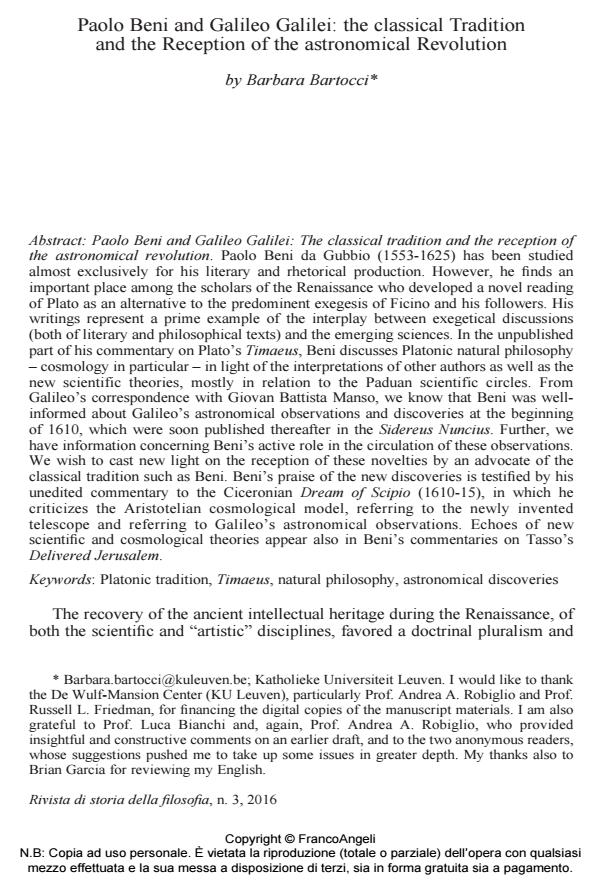Paolo Beni and Galileo Galilei: the classical Tradition and the Reception of the astronomical Revolution
Journal title RIVISTA DI STORIA DELLA FILOSOFIA
Author/s Barbabra Bartocci
Publishing Year 2016 Issue 2016/3
Language English Pages 30 P. 423-452 File size 125 KB
DOI 10.3280/SF2016-003003
DOI is like a bar code for intellectual property: to have more infomation
click here
Below, you can see the article first page
If you want to buy this article in PDF format, you can do it, following the instructions to buy download credits

FrancoAngeli is member of Publishers International Linking Association, Inc (PILA), a not-for-profit association which run the CrossRef service enabling links to and from online scholarly content.
Paolo Beni da Gubbio (1553-1625) has been studied almost exclusively for his literary and rhetorical production. However, he finds an important place among the scholars of the Renaissance who developed a novel reading of Plato as an alternative to the predominent exegesis of Ficino and his followers. His writings represent a prime example of the interplay between exegetical discussions (both of literary and philosophical texts) and the emerging sciences. In the unpublished part of his commentary on Plato’s Timaeus, Beni discusses Platonic natural philosophy - cosmology in particular - in light of the interpretations of other authors as well as the new scientific theories, mostly in relation to the Paduan scientific circles. From Galileo’s correspondence with Giovan Battista Manso, we know that Beni was wellinformed about Galileo’s astronomical observations and discoveries at the beginning of 1610, which were soon published thereafter in the Sidereus Nuncius. Further, we have information concerning Beni’s active role in the circulation of these observations. We wish to cast new light on the reception of these novelties by an advocate of the classical tradition such as Beni. Beni’s praise of the new discoveries is testified by his unedited commentary to the Ciceronian Dream of Scipio (1610-15), in which he criticizes the Aristotelian cosmological model, referring to the newly invented telescope and referring to Galileo’s astronomical observations. Echoes of new scientific and cosmological theories appear also in Beni’s commentaries on Tasso’s Delivered Jerusalem.
Keywords: Platonic tradition, Timaeus, natural philosophy, astronomical discoveries
- Encyclopedia of Renaissance Philosophy Lorenzo Sacchini, pp.1 (ISBN:978-3-319-02848-4)
- Encyclopedia of Renaissance Philosophy Lorenzo Sacchini, pp.359 (ISBN:978-3-319-14168-8)
Barbabra Bartocci, Paolo Beni and Galileo Galilei: the classical Tradition and the Reception of the astronomical Revolution in "RIVISTA DI STORIA DELLA FILOSOFIA" 3/2016, pp 423-452, DOI: 10.3280/SF2016-003003